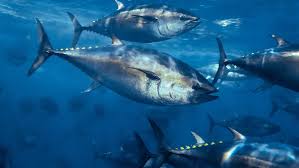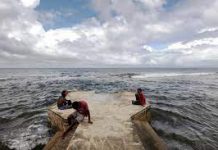By Francisco Blaha
If you were to speak about “IUU fishing” 10 or 15 years ago, only a few fish nerds would have known what you were saying. Even today, when there is much more known about it, it is still a complex concept to grasp.
Illegal, unreported and unregulated (IUU) fishing is a broad term that captures a wide variety of fishing activity. To mark International Day for the Fight Against IUU Fishing today, we can look into what IUU fishing is and how it operates in the Western and Central Pacific Ocean (WCPO).
IUU fishing is found in all types and dimensions of fisheries; it occurs both on the high seas and in areas within national jurisdictions. It concerns all aspects and stages of the capture and utilisation of fish, and it may sometimes be associated with organised crime.
These days, we hear a lot of conversations on IUU fishing, but not much on what the term means, and how and where the fish become IUU products. Recently, I asked someone who was complaining to me about IUU fishing what specific area he was worried about. As an answer I got: “You know, the tuna factory supertrawlers”. This is something that does not exist.
People say “IUU” as if it were one word, but it is not one concept, and may not happen all at once. Also, each of its components may have a different prevalence in different ocean basins.
IUU fishing has three separate components that may not be linked
Broadly, there are three components to the IUU concept. They are not mutually exclusive, but also can be occur independently. A simplified “definition” of each of the concept follows.
Illegal fishing is conducted by vessels that fail to comply with the licensing conditions put upon their operations, types of gears, access restrictions and so on, by their own legislation, the legislation of the coastal states whose waters they fish in, and/or are parties to a regional fisheries management organisation (RFMO) but operate in violation of its rules, or operate in a country’s waters without permission.”
Unreported fishing is catch that is either not reported or is misreported to relevant national authorities or the RFMO. (As reporting accurately is a licensing condition, to a certain extent unreported fishing is also illegal fishing.)
Unregulated fishing is conducted in areas or for fish stocks where there are no applicable conservation or management measures and where such fishing activities are conducted in a manner inconsistent with state responsibilities for the conservation of living marine resources under international law. (Conservation and management measures are rules set by an RFMO that govern fishing in its jurisdiction.) This terms also covers vessels without nationality or flying the flag of states that are not parties of relevant fisheries organisations, and which therefore consider themselves not bound by their rules.
So, the first two are related to each other, and unregulated fishing is much rarer these days. There are only a few areas of the world that are not under the management of an RFMO, one of them being the South Atlantic off the coast of Argentina beyond the country’s exclusive economic zone.
Combating the different types of IUU fishing activities demands different responses, and different state actors are involved. Some responses rely on the national legal frameworks, which may need improvement, while others rely on regional organisations such as FFA, and international frameworks, as is the case of RFMOs.
For us in the WCPO, we have robust systems based on the unique coastal-state cooperation (via the Forum Fisheries Agency and the Pacific Community) that marks our region. We use common tools, like the shared registers; the vessel monitoring system; shared surveillance operations with the support of the USA, France, Australia and New Zealand defence assets; and so on.
These tools have been in use in our region for a couple of decades now. Therefore, we have achieved a solid level of control over the common understanding of what illegal fishing is, and, as said, unregulatedfishing has not been a problem in the region for many years.
Unreported fishing the main problem in the WCPO
The FFA 2016 IUU fishing quantification study (currently being updated by way of IUU mitigation progress report) showed that the key area of problems for us is unreported fishing. This can happen in different individual or combined ways, including non-reporting, misreporting (saying you caught A, when in reality you caught B) and under-reporting (declaring you got 50 when in reality you caught 70).
So, this is the area we are focusing on in the WCPO, through a series of initiatives and innovations such as strengthening our port state measures, monitoring transhipments with remotely read electronic hook scales, catch documentation schemes, and electronic reporting and monitoring, just to name a few.
A further area that is problematic is transhipments on the high seas. The coastal states have no jurisdiction, so it is up to the flag state of the vessels involved to manage and these are mostly undertaken by distant water fishing nations.
The critical problem around the tools and solutions we have for IUU fishing is that they are all remedial. This means we need to also work on the drivers of IUU fishing to prevent it from happening in the first place. This is because IUU fishers are primarily driven by the fact that the activity has a potential net economic benefit. If we don’t work on minimising the incentives for the IUU fishers to stop engage in these practices, we will always be running behind the ball.
Yet this is complex, since it involves issues that are beyond fishing and goes into other areas in the maritime domain, such as the existence of tax havens and other non-cooperative practices such as open registries and flags of convenience, which may provide IUU fishing operators with low taxes and reduced chances of getting caught. Another factor is the existence of excess or idle fishing capacity in rich countries, which incites operators to engage in IUU fishing activities to earn higher revenues and reduce fishing vessel and crew costs, coupled with the presence of subsidies that reduce the cost of IUU fishing capacity.
And, unfortunately, the prevalence of poor economic and social conditions in some countries reduces the cost of fraud, crew costs, the cost of risk, and the costs associated with maintaining appropriate safety and working standards.
I welcome that the General Assembly of the United Nations (UN) declared 5 June the International Day for the Fight Against IUU Fishing back in November 2017. Not only for people to know more about the measures that we are taking as a region, but also to understand better what IUU fishing is, how it affects the region and, more importantly, how can we deter it from continuing.
SOURCE: TUNA PACIFIC/PACNEWS


















